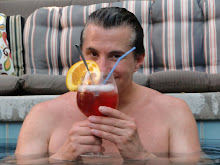Crusaders for Truth: Heart and Soul Makes ‘Masters of Sex’ More than Physical
Richard Lloreda, Staff Writer
September 19, 2014
Right from the playful opening credits, Masters of Sex, Showtime’s critically acclaimed seriocomic series, examines sex, from what its power is to how people define themselves through it, a subject that still raises gooseflesh in mixed company.
The program is presented as a tasteful period drama set in Middle America, namely Washington University in St. Louis, Mo., during the buttoned-up 1950s and early 1960s. With human sexual response as its topic, it is everything that revolves around sex from which the real dramatic thrust comes.
As Dr. William Masters and Dr. Virginia Johnson’s relationship unfolds, the program reveals more than what the naked eye can see. Their research touches off more than just a laboratory’s conditioned environment would have allowed. They are in fact part of their research.
Each inspires the other to stretch their intellectual capabilities by exploring their differences. Their relationship is intricate as research partners, co-authors and more—much, much more than either one of them ever imagined. In modern terms, they could be seen as Pierre and Marie Curie, or to some, Victor and Elizabeth von Frankenstein.
Therein lays the conflict of opinion debated by Masters and Johnson.
Michael Sheen portrays Masters with brooding complexity. The emotionally unavailable Masters just begs to peel back his buttoned up layers, and Lizzie Caplan depicts Johnson as the intuitive explorer carefully pursuing her quest for emotional truth.
Their conflicting viewpoints are the weekly spark that ignites this powder keg of a mid-century drama. Inspired by Thomas Maier’s book, Masters of Sex: The Life and Times of William Masters and Virginia Johnson, the Couple Who Taught America How to Love, the program unfolds elegantly, playing against the backdrop of the Eisenhower to Johnson administrations.
Five Golden Globe nominations and a win for best actress Allison Janney as Margaret Scully in 2014 show the program is clearly a hit with critics and audiences.
“Masters and Johnson were suddenly famous with the publication of their first landmark book, Human Sexual Response,” according to Maier.
However, this series is not about fame or even solely about sex so much as it is about the human responses to life as lived through this complicated period of world history. Topics woven throughout the program confront themes including the inequality of women, the struggle with integration, battles against racism and breaching the taboo subject of sex and all of its facets, which parallel modern day anxieties.
Masters’ take on the study is from a physiological point of view, but as the story unfolds, it is Johnson, compelled by the psychological effects, who guides the personal outlooks regarding all aspects of the motivations of behaviors behind the sexual responses. Masters is emotionally isolated and is somewhat perplexed by human relationships. His struggle is based on a complicated past, and by studying human sexual responses in a clinical light he keeps emotions at a safe distance. Love is something he cannot wrap his mind around, as evidenced by his rudimentary approach to intimacy with his wife, Libby Masters, played by Caitlin Fitzgerald.
Johnson is discovering that the questions raised by the study touch her in ways she finds intriguing about both other human beings and herself. She struggles with being taken seriously, even by Dr. Masters, in the male dominated world of the hospital environment and larger society. She is ostracized by her female peers, who regard her as an oddity, whispering rumors about this strange sex research in which she is involved with Masters. As a single mother, she is both fighting for independence and doing work she cares about with the added financial realities that lead to her to sell diet pills to make ends meet.
Johnson discovers enlightenment in her dealings with very human aspects of sexual response through the study. She is emotionally connected and desires to tell the personal stories behind the sexual behavior. Her road is one of mounting self-discovery as seen in her ability to form complex friendships with women. Johnson begins, through the study, to question and then understand her motivations and who Dr. Masters is. Johnson is a woman alone yet so immersed in the study that she really isn’t wounded by loneliness. Although her focus is on her work, she also develops a certain savvy in a man’s world, maneuvering around men with watchful caution, reacting to her situations as case scenarios.
If Masters of Sex were a Turner Classic Movie, one could easily imagine the story set in the mid-1950s. Dr. Masters would be played by Henry Fonda at his most removed self. Johnson would be Ava Gardner, completely covered up, far more seductive and compelling than currently portrayed in today’s overly sexualized visually stimulated society. The irony of Masters of Sex lies in the fact that while there is nudity and there are sexual situations, these are not the most provocative aspects of the program. The key to the exciting story line is everything else going on rather than the actual sex.
Michael Sheen’s Masters is fairly bursting to tell the audience why his character is so pent up. Caplan presents Johnson as so fascinating that she could make emptying a swimming pool with a teaspoon mind-blowing. In other words, if a cigarette company sponsored this program there would be a veritable skyrocket in sales on Sunday nights. Masters of Sex is high-performance drama that leaves the audience to ponder more questions than answers, a format that maximizes viewing pleasure.
In a nutshell, Masters of Sex, Masters and Johnson’s relationship reflects the timeless lyrics of Johnny Mercer, “When an irresistible force such as you meets an old immovable object like me you can bet just as sure as you live something’s gotta give.”



No comments:
Post a Comment